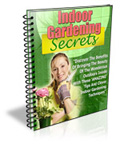Welcome to Gardening Guide
Creative Gardening Vegetable Article
 . For a permanent link to this article, or to bookmark it for further reading, click here.
. For a permanent link to this article, or to bookmark it for further reading, click here.
GARDENING VEGETABLE WINTER
from:Can the cold improve your favourite gardening vegetable? Winter is approaching and maybe you think you’d better get all of your vegetables in before the first frost. Actually, you don’t have to do that with every gardening vegetable. Winter cold will not spoil all of your root crops, and will even enhance the flavour of some of them.
Of course, you have to protect even the hardiest gardening vegetable. Winter freezes the ground solid in some places, and harvesting those root crops would be difficult if the ground was like iron. First, cover the tops (shoulders) of the root crops with soil. Then cover the garden with a thick layer of mulch. This is good protection for the root gardening vegetable. Winter will be kept at bay. The mulch should be shredded dry leaves, salt hay or straw, and should be one or two feet deep. Pull the mulch close around the stems of the plants. Use pine boughs or boards to hold the mulch in place. Mark the crops with tall stakes so you can find them under the snow. This form of outdoor storage is a great way to keep this kind of gardening vegetable. Winter actually keeps the root crops better than they would keep indoors in refrigeration. You can leave carrots, leeks, parsnips and turnips in the ground all winter in most places, harvesting them as you need them. In regions where the winters are not too severe, this method also works for beets, celeriac and another gardening vegetable, winter radishes. It saves on your indoor storage space. Even better, your vegetables will stay firm and in good condition. Some, like carrots, even taste better after a frost.
Gardeners in cold climates can also grow vegetables through the winter in a cold frame. This is a special box in which you can grow leafy vegetables. Gardening centres can provide instructions on how to build and insulate your cold frame. Build your cold frame against the south side of your house in a place where it will get maximum exposure to the sun. This will also protect it from the cold north winds. The soil in your cold frame should be well drained. It should also be rich in organic matter. Mix in plenty of compost or leaf mold and composted manure before planting. You can plant your leafy vegetables directly in the cold frame, or start them in the ground in early autumn and then transfer them before the weather turns cool. When you harvest, just pick a few outside leaves from each plant. The vegetables should continue to grow all winter.
Creative Gardening Vegetable News



